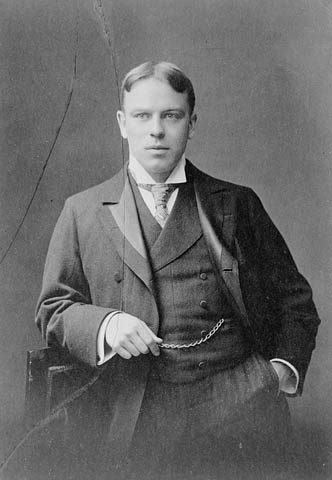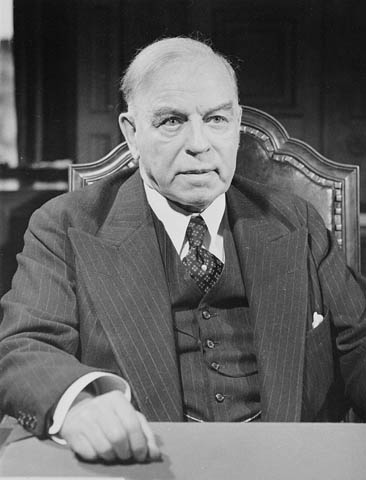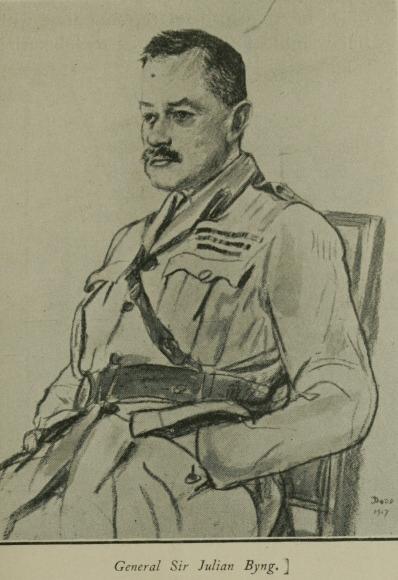|
King–Byng Affair
The King–Byng affair, also known as the King–Byng Wing Ding, was a Canadian constitutional crisis that occurred in 1926, when the governor general of Canada, Lord Byng of Vimy, refused a request by the prime minister, William Lyon Mackenzie King, to dissolve parliament and call a general election. The 1925 Canadian federal election saw King's Liberals winning fewer seats than the Conservatives, who were left eight seats short of a majority. The Progressives lost almost two thirds of their seats from the previous election, but they still held enough seats to control the balance of power. As the incumbent party is given the first opportunity to form government, King decided to attempt to hold on to power with the help of the Progressives. The Progressives were closely aligned with the Liberals and enabled King to form a minority government. In June 1926, facing a Commons vote that could force his government to resign, King asked Governor General Byng to dissolve parli ... [...More Info...] [...Related Items...] OR: [Wikipedia] [Google] [Baidu] |
William Lyon Mackenzie King
William Lyon Mackenzie King (December 17, 1874 – July 22, 1950) was a Canadian statesman and politician who was the tenth prime minister of Canada for three non-consecutive terms from 1921 to 1926, 1926 to 1930, and 1935 to 1948. A Liberal, he was the dominant politician in Canada from the early 1920s to the late 1940s. King is best known for his leadership of Canada throughout the Great Depression and the Second World War. He played a major role in laying the foundations of the Canadian welfare state and establishing Canada's international position as a middle power. With a total of 21 years and 154 days in office, he remains the longest-serving prime minister in Canadian history and as well as the longest-serving Liberal leader, holding the position for exactly 29 years. King studied law and political economy in the 1890s and later obtained a PhD, the first of only two Canadian prime ministers to have done so. In 1900, he became deputy minister of the Canadian government ... [...More Info...] [...Related Items...] OR: [Wikipedia] [Google] [Baidu] |
Statute Of Westminster 1931
The Statute of Westminster 1931 is an act of the Parliament of the United Kingdom that significantly increased the autonomy of the Dominions of the British Commonwealth. Passed on 11 December 1931, the statute increased the sovereignty of the self-governing Dominions of the British Empire from the United Kingdom. It also bound them all to seek each other's approval for changes to monarchical titles and the common line of succession. The statute was effective either immediately or upon ratification. It thus became a statutory embodiment of the principles of equality and common allegiance to the Crown set out in the Balfour Declaration of 1926. As the statute removed nearly all of the British parliament's authority to legislate for the Dominions, it was a crucial step in the development of the Dominions as separate, independent, and sovereign states. Its modified versions are now domestic law in Australia and Canada; it has been repealed in New Zealand and implicitly in for ... [...More Info...] [...Related Items...] OR: [Wikipedia] [Google] [Baidu] |
1921 Canadian Federal Election
The 1921 Canadian federal election was held on December 6, 1921, to elect members of the House of Commons of Canada of the 14th Canadian Parliament, 14th Parliament of Canada. The Unionist Party (Canada), Union government that had governed Canada through the First World War was defeated, and replaced by a Liberal Party of Canada, Liberal government under the young leader William Lyon Mackenzie King. A new third party, the Progressive Party of Canada, Progressive Party, won the second most seats in the election. Since the 1911 Canadian federal election, 1911 election, the country had been governed by the Conservative Party of Canada (historical), Conservatives, first under the leadership of Prime Minister of Canada, Prime Minister Robert Borden and then under Prime Minister Arthur Meighen. During the war, the Conservatives had united with the pro-conscription Liberal-Unionists and formed a Union government. A number of Members of Parliament (MPs), mostly Quebecers, stayed loyal ... [...More Info...] [...Related Items...] OR: [Wikipedia] [Google] [Baidu] |
14th Canadian Parliament
The 14th Canadian Parliament was in session from 8 March 1922 until 5 September 1925. The membership was set by the 1921 Canadian federal election, 1921 federal election on 6 December 1921, and it changed somewhat due to resignations and by-elections. It was dissolved on 5 September 1925, causing the 1925 Canadian federal election, 1925 election. It was controlled by a Liberal Party of Canada, Liberal Party government under Prime Minister of Canada, Prime Minister William Lyon Mackenzie King and the 12th Canadian Ministry. The Official Opposition (Canada), Official Opposition was the Conservative Party of Canada (historical), Conservative Party, led by Arthur Meighen, although the new Progressive Party of Canada, Progressive Party led by Thomas Crerar had more seats. The appearance of the Progressive Party created a three-party system in the House for the first time since the 1867 Anti-Confederation Party. The Speaker of the House of Commons of Canada, Speaker was Rodolphe Le ... [...More Info...] [...Related Items...] OR: [Wikipedia] [Google] [Baidu] |
House Of Commons Of Canada
The House of Commons of Canada () is the lower house of the Parliament of Canada. Together with the Monarchy of Canada#Parliament (King-in-Parliament), Crown and the Senate of Canada, they comprise the Bicameralism, bicameral legislature of Canada. The House of Commons is a democratically elected body whose members are known as Member of Parliament (Canada), members of Parliament (MPs). The number of MPs is adjusted periodically in alignment with each decennial Census in Canada, census. Since the 2025 Canadian federal election, 2025 federal election, the number of seats in the House of Commons has been 343. Members are elected plurality voting, by simple plurality ("first-past-the-post" system) in each of the country's Electoral district (Canada), electoral districts, which are colloquially known as ''ridings''. MPs may hold office until Parliament is dissolved and serve for constitutionally limited terms of up to five years after an election. Historically, however, terms have ... [...More Info...] [...Related Items...] OR: [Wikipedia] [Google] [Baidu] |
Arthur Meighen
Arthur Meighen ( ; June 16, 1874 – August 5, 1960) was a Canadian lawyer and politician who served as the ninth prime minister of Canada from 1920 to 1921 and from June to September 1926. He led the Conservative Party from 1920 to 1926 and from 1941 to 1942. Meighen was born in Anderson, Ontario. His family came from County Londonderry, Ireland. He studied mathematics at the University of Toronto, and then trained to be a lawyer. After qualifying to practise law, he moved to Portage la Prairie, Manitoba. Meighen entered the House of Commons of Canada in 1908, and in 1913 was appointed to the Cabinet of Prime Minister Robert Borden. Meighen prominently served as solicitor general, minister of the interior, and superintendent-general of Indian affairs. In July 1920, Meighen succeeded Borden as Conservative leader and prime minister – the first born after Confederation. Meighen suffered a heavy defeat in the 1921 election to Mackenzie King and the Liberal Party. M ... [...More Info...] [...Related Items...] OR: [Wikipedia] [Google] [Baidu] |
Elections In Canada
Canada holds elections for legislatures or governments in several jurisdictions: for the Government of Canada, federal (national) government, Provinces and territories of Canada, provincial and territorial governments, and Municipal government in Canada, municipal governments. Elections are also held for First Nations government (Canada), self-governing First Nations and for many other public and private organizations including Canadian corporation, corporations and trade unions. Municipal elections can also be held for both upper-tier (regional municipality or county) and lower-tier (town, village, or city) governments. Formal elections have occurred in Canada since at least 1792, when both Legislative Assembly of Upper Canada, Upper Canada and Legislative Assembly of Lower Canada, Lower Canada had their first elections. Canada's first recorded election was held in Halifax in 1758 to elect the 1st General Assembly of Nova Scotia. All Canadian citizens aged 18 or older may re ... [...More Info...] [...Related Items...] OR: [Wikipedia] [Google] [Baidu] |
Drop The Writ
A writ of election is a writ issued ordering the holding of an election. In Commonwealth countries writs are the usual mechanism by which general elections are called and are issued by the head of state or their representative. In the United States, writs are more commonly used to call special elections for political offices. In some countries, especially in Canada,Haydn Watters"Many writs, no 'dropping': What the election call actually means" ''CBC News'', September 11, 2019 the process of issuing writs of election is referred to as "dropping the writ", likely derived from the phrase "drawing up the writ". In some parliamentary systems, the head of government (e.g. prime minister or premier) advises the head of state to issue writs of election (typically following the dissolution of parliament in order to hold general elections, but also for by-elections). The head of state usually reserves the right to refuse the request, in which case the head of government is required by ... [...More Info...] [...Related Items...] OR: [Wikipedia] [Google] [Baidu] |
Dissolution Of Parliament
The dissolution of a legislative assembly (or parliament) is the simultaneous termination of service of all of its members, in anticipation that a successive legislative assembly will reconvene later with possibly different members. In a democracy, the new assembly is chosen by a general election. Dissolution is distinct on the one hand from abolition of the assembly, and on the other hand from its adjournment or prorogation, or the ending of a legislative session, any of which begins a period of inactivity after which it is anticipated that the same members will reassemble. For example, the "second session of the fifth parliament" could be followed by the "third session of the fifth parliament" after a prorogation, but would be followed by the "first session of the sixth parliament" after a dissolution. In most Continental European countries, dissolution does not have immediate effect – that is, a dissolution merely triggers an election, but the old assembly itself continues its ... [...More Info...] [...Related Items...] OR: [Wikipedia] [Google] [Baidu] |
The Lord Byng Of Vimy
Field marshal (United Kingdom), Field Marshal Julian Hedworth George Byng, 1st Viscount Byng of Vimy, (11 September 1862 – 6 June 1935), was a British Army officer who served as Governor General of Canada, the List of governors general of Canada#Governors general of Canada, 1867–present, 12th since the Canadian Confederation. Known to friends as "Bungo", Byng was born to a Nobility, noble family at Wrotham Park in Hertfordshire, England and educated at Eton College, along with his brothers. Upon graduation, he received a commission as a militia officer and saw service in Egypt and Sudan before enrolling in the Staff College, Camberley, Staff College at Camberley. There, he befriended individuals who would be his contemporaries when he attained senior rank in France. Following distinguished service during the First World War—specifically, with the British Expeditionary Force (World War I), British Expeditionary Force in France, in the Battle of Gallipoli, as commander of t ... [...More Info...] [...Related Items...] OR: [Wikipedia] [Google] [Baidu] |
Advice (constitutional)
Advice (noun) or advise (verb) may refer to: * Advice (opinion), an opinion or recommendation offered as a guide to action, conduct * Advice (constitutional law) a frequently binding instruction issued to a constitutional office-holder * Advice (programming), a piece of code executed when a join point is reached * Advice (complexity), in complexity theory, a string with extra information used by Turing machine or other computing device * Pay advice, also known as a pay slip * , various Royal Navy ships * "Advice" (song), a 2018 song by Cadet and Deno Driz * "Advice" (song), the debut single by Christina Grimmie * "Advice", a song by Kehlani from her album SweetSexySavage * "Advice", a song by Cavetown * ADVISE (Analysis, Dissemination, Visualization, Insight, and Semantic Enhancement), a research and development program within the US Department of Homeland Security * The Advice, an American Contemporary Christian band ** ''The Advice'' (album), the band's 2013 debut albu ... [...More Info...] [...Related Items...] OR: [Wikipedia] [Google] [Baidu] |
Chambre Des Communes 1925
*
{{disambiguation, surname ...
Chambre (French for ''chamber'') may refer to: * Chambre des Pairs * Chambre des Députés * Chambre de bonne * Chambre introuvable * Valet de chambre * Chambre Ardente People with the surname * Alan Chambré * Calcot Chambre See also * Chambre des représentants (other) * Chamber (other) Chamber or The Chamber may refer to: Organizations and government *Chamber of commerce, a form of business network * Legislative chamber, a deliberative assembly within a legislature * Debate chamber, a room for people to discuss and debate Ar ... [...More Info...] [...Related Items...] OR: [Wikipedia] [Google] [Baidu] |





